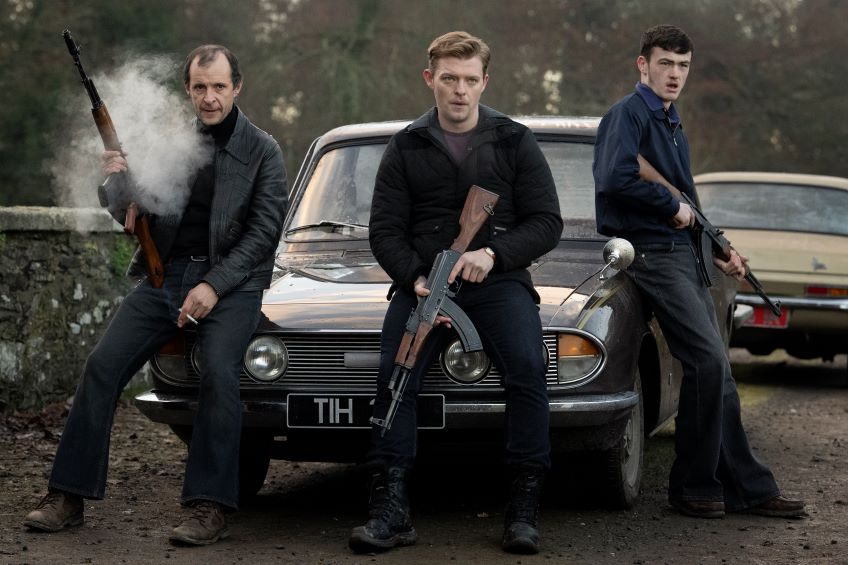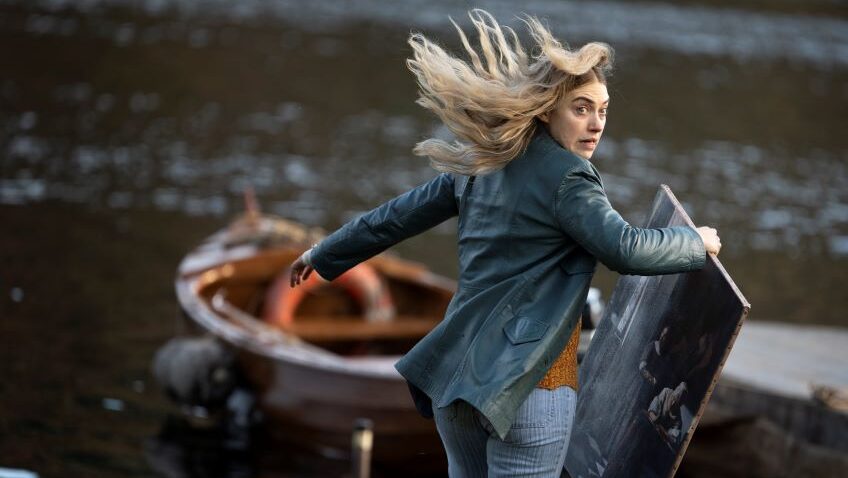Joyce Glasser reviews Baltimore (March 22, 2024), Cert 15, 98 mins.
Imogen Poots (The Father, The Look of Love, 28 Days Later) is not only an attractive woman and talented actress but has the ability to scrub down convincingly. Her movie star looks never detract from her performance as Rose Dugdale, an IRA team-leader holing up in a drafty rented house in County Wicklow, with morning sickness, an infected hand wound, a dirty job to do and no washing machine. Then again, Dugdale scrubbed up pretty well, too, when, as a debutante sixteen years earlier, she begrudgingly curtsied before the Queen – the price she paid to go to Oxford.
It is not Poots’ magnetic performance that falls short in writer-director Joe Lawlor and Christine Molloy’s thriller, nor the engrossing “based on true events” story of an English debutante-turned-IRA-bomber/kidnapper/thief, but a script that cannot decide on its focus.
The setting is not Baltimore, Maryland. In fact, the Baltimore in question, which we never see, is Baltimore in County Cork, Ireland. It is here that Dugdale is to be reunited with the father of her child, Eddie Gallagher (Jack Meade) and her two IRA accomplices Dominic (Tom Vaughan-Lawlor and Martin (Lewis Brophy) after negotiating the return of 19 masterpieces from the walls of Russborough House for money and two valuable IRA prisoners.

It is April 26, 1974. The film opens in media res with a woman in a red wig, dirt and make up smeared across her face, and a bleeding hand leaving the scene of the crime, Russborough House in County Wicklow, Ireland and the largest heist (at that time) in history. Here, Dugdale hand picks 19 masterpieces from the collection of anti-Apartheid campaigner and philanthropist Lord Alfred Beit, which include a Gainsborough, Rubens, Goya, and Vermeer’s Lady Writing a Letter with her Maid.
The elderly Beits (Andrea Irvine and Jim Kavanagh) are pistol whipped, gagged and tied up, while Dugdale contemplates the Vermeer with little Patrick (Flynn Gray) the petrified son of a heroic house servant, wounded and subdued. Pointing to the maid gazing out the window while her mistress writes a letter for her to deliver, she tells the boy: ‘I think she is imagining life if she were not a maid.’
Unfortunately, a spider’s web of flashbacks interrupts this long sequence in cutaways that are so frequent, distracting and occasionally confusing, that the horror of the home invasion is diminished.
Writer-director duo Joe Lawlor and Christine Molloy are careful to set out the motivations for Dugdale’s actions, which have everything to do with her disgust with her life of privilege. We first see Dugdale (Jude McClean) in 1951, age ten, in front of the family seat in Devon where she cannot share her father’s (Simon Coury) pride at killing her first fox. Six years later she is with her mother (Carrie Crowley) admiring a painting in a gallery, but it is the plight of a black maid in the painting that she finds moving and memorable.
More sepia flashbacks take us through Dugdale’s radicalisation in Oxford, beginning with her attendance at various protest meetings and culminating with her daring infiltration of the all-male Oxford Union Debating Society, convincingly disguised as a boy before ripping off her disguise. Such is her low opinion of her parents that Dugdale even burgles their Devon mansion. When she is caught in the act of stuffing silver dinnerware into sacks with an IRA accomplice she introduces her Black accomplice to her shocked parents as her lover. Her privilege spares her jail, but the lover serves a long sentence.
When Dugdale is 31 she joins the provisional IRA, and another flashback dramatising her answering questions about her commitment to the cause before demonstrating her mastery of assembling a bomb to impressed IRA officials.

When Molloy and Lawlor are not trying to cram expository information into sketchy, unengaging flashbacks or suggesting Dugdale’s thought processes through troubled dreams, they stage some terrific, tense moments in the aftermath to the heist. You hold your breath when a police officer comes around, investigating reports of two strangers being seen in the area (prompting her to send the indiscreet Dominic and Martin to the Baltimore safehouse).
There are two hair-raising scenes with the suspicious pub landlady who observes the increasingly frazzled Dugdale’s phone conversations from the pub’s pay phone. Your heart will be beating along with Dugdale’s when she goes to execute the elderly, Donal (a terrific Dermot Crowley) because the ridiculously phoney French accent Dugdale uses in the heist, and momentarily forgets to drop, arouses his suspicion.
We can see how Dugdale’s early training with a fox hunting gun, her knowledge of art (her mother was actually related to the Beits), her knowledge of French (she was homeschooled by a French governess) and her facility with disguises from the Oxford Union days are utilised in her plan. The most satisfying aspect of the film is watching this plan fall apart with Dugdale having so much to prove, and so much at stake. That said, Rose Dugdale did succeed in earning her coveted notoriety.




